On the internet, you may find many diet plans for weight loss. But you may not find many for weight gain, even though there are a significant number of people who struggle with gaining weight.
Individuals who are underweight or skinny may have an underlying issue which may not always be because they eat too few calories for a prolonged period of time. Being underweight or malnourished may lead to different medical illnesses.
The weight gain equation is quite simple and is based on the amount of calories that you can burn. If your metabolism is high or you vigorously exercise, you may need to consume more calories to meet your body’s requirements. Simply overeating may not be a solution to gain weight. However, spacing your meals as three to six times a day, adding more protein and fat to your diet, and including high-calorie snacks can be some ways to gain weight naturally under a nutritionist’s guidance.
People who consume various supplements and unhealthy foods to gain weight quickly without doing any prior research may face medical problems. Thus, it’s important to be mindful of what you eat and cautious to not make extreme changes to a diet and lifestyle without the advice from a doctor. You may eat healthy foods that can help build muscle and increase your strength. If you are trying to gain some weight, the following guide may help for healthy foods that you can eat 1.
As highlighted earlier, the main concept is to eat more calories than you use during your day. A rough estimate you can aim for is to take in 300 – 500 more calories than what you need. Another general idea is to eat more meals each day, rather than increasing the size of your existing meals. Increasing the amount of good quality fats and proteins in your diet may also be necessary when you’re trying to gain weight. It is recommended not to consume unhealthy fats and junk foods in an effort to put on weight. These types of food will result in weight gain only around your stomach area and thighs and can cause serious long-term issues in the coming years like diabetes, obesity and heart issues. It may also be a good idea to incorporate regular (but not intensive) exercise into your daily routine, as this can help build up your muscle mass and also boost your metabolism and strength 1.
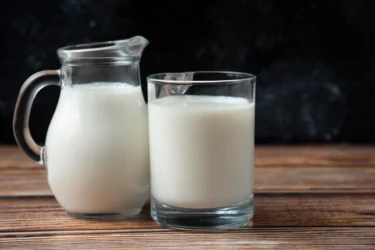
Milk is considered a complete food because it is rich in all nutrients that are essential for our body. It is high in proteins, calcium, carbohydrates, fats, minerals, and vitamins. It is an excellent source of protein that provides both casein and whey proteins. Studies4 have found that milk can help add muscle mass to the body. You can try drinking two glasses of milk per day with a meal or before or after a workout. If you are unable to digest milk as a whole, have it in a form of curd, yoghurt, or buttermilk1.
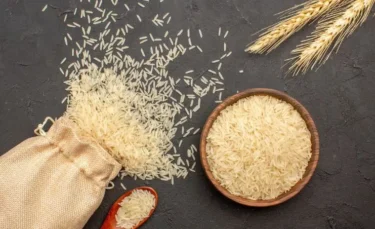
Rice is one of the most convenient and cheap sources of carbohydrates that can be beneficial to gain weight. Rice is also a calorie-dense food that means you can obtain carbohydrates and calories from a single serving. One cup of rice provides about 160 calories that contribute to gain weight 5.
You can have rice with different curries and vegetables that are high in proteins. This is the easiest way to add taste, calories, and a protein boost. Khichdi is a good example of a complete meal and helps to achieve better health and nutritional value while gaining weight.
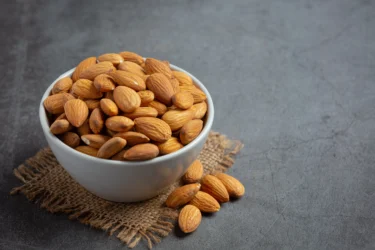
Consuming dried fruits and nuts can be beneficial for weight gain. This super-food contains various antioxidants, proteins, calories, and micronutrients. All types of dried fruit and nut have a naturally high sugar content that may help gain weight. You can eat them raw or roasted or even add them in yogurt, smoothies and milkshakes. A daily handful of dried fruits and nuts such as almonds, walnuts, and cashew can be considered best for weight gain6.
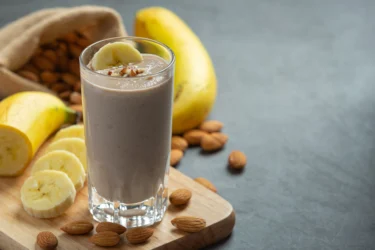
Homemade smoothies are much healthier than ready-made protein supplements. A shake may be most effective at helping to build muscle if taken shortly after a workout. They are also rich in flavour and taste. Here are some examples of homemade smoothies that can help gain weight quickly, such as chocolate banana nut shake, vanilla berry shake, chocolate hazelnut shake, and super green shake. Do make it a point to add some natural sweetness to increase up the calories like dates, honey, jaggery, agave etc3.

Red meat is a rich source of protein that helps to build muscles and increase weight. It contains leucine and creatinine, nutrients that play a significant role in increasing muscle mass. Steak and other red meats contain both protein and fat, which promote weight gain9. Both fatty and lean muscles provide proteins that can help you to gain weight8. One of the best sources is fat beef dishes brisket. But do remember to keep in mind your other medical parameters while consuming any non-vegetarian meals especially red meat or shelled fish.
Gaining weight can be relatively straightforward for non-vegetarians, given their wide array of food choices. However, it poses more challenges for vegetarians and can be even more difficult for those who are on restrictive diets. Vegetarians and those who are lactose intolerant face the issue of limited options. To address this, here are some recommended food items you may use. To boost calorie intake in these dietary preferences, consider incorporating soy milk, almond milk, coconut milk, rice milk, nuts, seed butters, tofu, olives, avocado, and vegetable oils into your meals.
Dr. Rajeev Singh, BAMS

Fatty fish such as salmon is rich in essential fatty acids and proteins. They help to gain weight and also boost your immunity. Omega-3 present in these fishes is considered the best source that is significant for weight gain10. You can prepare different dishes from salmon like steamed fish, fried fish, and smoked salmon. In India, Surmai and Ravas are the closest to Salmon.
Also Read: Is Mounjaro Approved for Weight Loss? Here’s What Our Endocrinologist Says

Starchy foods such as potatoes, sweet potatoes and corn are a popular and tasty option for quick weight gain. It is a cost-effective option that provides extra calories for your body. These foods contain carbohydrates and calories that increase muscle glycogen stores. Studies have found that many of these starchy foods also contribute to essential nutrients and fibre, as well as resistant starch, which can help nourish your gut bacteria and help gain weight7, 12.

The simple whole grain bread is a good source of carbohydrates that will increase your weight. They can be a well-balanced meal when prepared with protein sources like eggs, meat, and cheese or paneer. The live, good bacteria in sourdough feed bacteria in the gut that can strengthen your immune system13. Sour dough breads can be combined with avocado for a healthy meal balance.
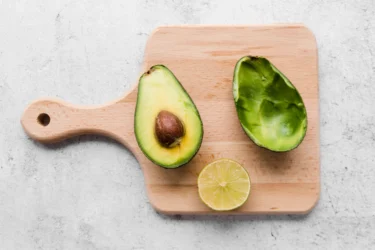
Avocados are an excellent source of fats, antioxidants, vitamins, and fibres14. You can add avocado to your main meal, sandwiches, and other dishes which can be beneficial for weight gain3. Guacamole is a very common avocado dish which comes close to the Indian or Asian cusine.

Whole eggs are a valuable option for weight gain as they are full of proteins, calcium, and healthy fats2. They are muscle building foods and are readily available everywhere . It is beneficial to eat the whole egg, as the egg yolk is most nutritious.
Studies11 have shown that increasing the intake of fats and proteins might help you gain weight naturally. To my knowledge, food items like red meats, chicken, fish, beans, whole milk, eggs, cheese, full-fat yoghurt, nuts, butter, and olives may help in gaining weight while maintaining your health. You may try these options in your meals in different combinations.
Dr. Siddharth Gupta, B.A.M.S, M.D (Ayu)
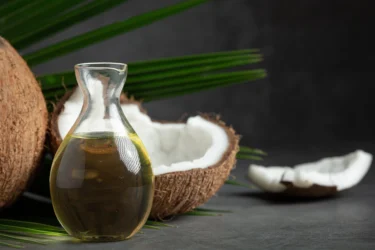
Healthy oils are extremely calorie-dense and do not come with the downsides of other unhealthy oils. You can add these oils to salad dressings, as a seasoning base, or for cooking. Avocado oil, extra virgin olive oil and coconut oil are three healthy oils that can help increase your caloric intake. Another method to incorporate healthy oil into your diet is to add one of these oils with a small amount of butter to your morning coffee. It is delicious and healthy!
Also Read: Natural Home Remedies To Reduce Belly Fat
The possibility of gaining weight overnight is a hoax or myth. A healthy, consistent diet, strength training and a set of different weight gain exercises all play their part in helping you gain weight. Out of this, diet and food have an important role. The following meal-plan can be incorporated for your weight gain diet:
Include food items like whole-grain bread slices with peanut butter and honey; a glass of milkshake; a medium-sized seasonal fruit; milk with chia seeds or sabja and oats; poached eggs; avocado toast. Avoid caffeine products like tea or strong coffee. You can also incorporate Indian foods like paratha or thepla with curd or idli or dosa with sambar and chutney. with curd or idli or dosa with sambar and chutney. or dosa with sambar and chutney.
You can add food items like chicken pasta made with leafy green vegetables, feta cheese, olive oil, tomato and avocado; egg, cheese and salad wraps; lentil, vegetable and barley soup; chicken and noodle stir fry; a bowl of rice with vegetables and fish; chicken rice with corn; chapati, chicken curry and a bowl of yoghurt or Indian staple food Khichdi made with rice and dals and vegetables as a one pot meal.
You can add your choice of rice/chapati as preferred and have it with fish, chicken, vegetables. A bowl of chicken soup with corn may also be added. Do add some salad to balance the fibre intake for the day..
Dried fruits have a great potential in helping gain weight. A handful of almonds, cashews or walnuts every day may be a healthy snacking option. Seeds like sunflower seeds and whole-grain crackers with hummus dip serve as a great snack option.
Also Read: Mounjaro (Injection): Uses, Side Effects, Dosage, and How It Works
There are many foods and supplements available that help with weight gain. Instead of trying to take in large amounts of sweets or fatty foods, choosing high-calorie foods that provide energy and build muscle mass may be beneficial. Regular, age-appropriate exercise along with a healthy and calorie-rich diet may be the best way to put on weight in a healthy manner. Avoid snacking in between meals, ensure that you are always hydrated and maintain a healthy, nutritious diet only. You will need a little perseverance as gaining weight is not a sprint, it takes patience, but the results will be worth the wait.
Also Read: Acidity Problems? 21 Home Remedies That Can Help
Yes, fruits can be a part of a weight gain diet as they provide natural sugars, vitamins and minerals. High-calorie fruits like bananas, avocados and mangoes can contribute to healthy weight gain. Pairing fruits with other calorie-dense foods can create nutritious and calorie-rich meals.
Yes, nuts are beneficial for weight gain as they are calorie-dense and packed with healthy fats, protein and fibre. Incorporating nuts into your diet can provide an easy and nutritious way to increase daily calorie intake.
Adding healthy fats to your diet for weight gain can be done by incorporating foods like avocados, nuts, seeds, olive oil, coconut oil and fatty fish into your meals. These sources of healthy fats not only increase calorie intake but also offer many health benefits.
Yes, dairy products can aid in healthy weight gain. Full-fat dairy options like whole milk, yogurt and cheese are rich in calories, protein and calcium, making them excellent choices for those looking to gain weight in a healthy manner.
Yes, including protein-rich foods in a weight gain diet is essential as protein is crucial for muscle development and repair. Foods like lean meats, poultry, fish, eggs, beans, lentils and dairy products are excellent sources of protein.
Yes, smoothies can be helpful for weight gain when prepared with calorie-dense ingredients. Incorporating fruits, nuts, seeds, yogurt, milk and protein powders into smoothies can make them nutritious and calorie-rich meals.
Yes, whole grains are good for weight gain as they provide complex carbohydrates, fibre and essential nutrients. Foods like whole-grain bread, pasta, brown rice and quinoa can be excellent additions to a weight gain diet.
Yes, you can gain weight healthily with plant-based foods by focusing on calorie-dense options like avocados, nuts, seeds, legumes, whole grains and plant-based protein sources like tofu and tempeh.
You can incorporate more calories into your meals for weight gain by adding healthy fats, protein-rich foods and calorie-dense ingredients like nuts, seeds, avocados and dried fruits. Eating frequent, balanced meals and snacks throughout the day can also help increase calorie intake.
1.. Health Direct Australia. What to do if you are underweight [Internet]. www.healthdirect.gov.au. 2019 [cited 2025 Apr 15]. Available from: https://www.healthdirect.gov.au/what-to-do-if-you-are-underweight
2. Emrani AS, Beigrezaei S, Zademohammadi F, Salehi-Abargouei A. The effect of whole egg consumption on weight and body composition in adults: a systematic review and meta-analysis of clinical trials. Systematic Reviews. 2023 [cited 2025 Apr 17]. Available from: https://pmc.ncbi.nlm.nih.gov/articles/PMC10353215/
3. Dietary Advice about Gaining Weight in a Healthy Way [Internet]. North Tees and Hartlepool NHS Foundation Trust. 2023 [cited 2025 Apr 15]. Available from: https://www.nth.nhs.uk/resources/dietary-advice-about-gaining-weight-in-a-healthy-way/
4. Berkey CS, Rockett HRH, Willett WC, Colditz GA. Milk, Dairy Fat, Dietary Calcium, and Weight Gain. Archives of Pediatrics & Adolescent Medicine [Internet]. 2005 Jun 1 [cited 2025 Apr 15];159(6):543. Available from: https://jamanetwork.com/journals/jamapediatrics/fullarticle/486041
5. Calorie Content Food List Starches and Grains: 80 calories per serving [Internet]. Calorie Content Food List . [cited 2025 Apr 15]. Available from: https://www.nutrition.va.gov/docs/UpdatedPatientEd/CalorieContentFoodList2018.pdf
6. Services D of H & H. Weight and muscle gain [Internet]. www.betterhealth.vic.gov.au. [cited 2025 Apr 15]. Available from: https://www.betterhealth.vic.gov.au/health/healthyliving/weight-and-muscle-gain#bhc-content
7. Welter G, Rokuski S. NUTRITION COUNSELING -CAMPUS HEALTH SERVICE -HEALTH PROMOTION Gaining Weight: A Healthy Plan for Adding Pounds [Internet]. Gaining Weight: A Healthy Plan for Adding Pounds. [cited 2025 Apr 15]. Available from: https://www.health.arizona.edu/sites/default/files/weight_gain_healthy_ways_to_add_pounds.pdf
8. Barr B, Levitt DE, Gollahon L. Red meat amino acids for beginners: A narrative review. Nutrients. 2025 [cited 2025 Apr 17]. Available from: https://pmc.ncbi.nlm.nih.gov/articles/PMC11946737/
9. Khodayari S, Sadeghi O, Safabakhsh M, Mozaffari-Khosravi H. Meat consumption and the risk of general and central obesity: the Shahedieh study. BMC Research Notes. 2022 [cited 2025 Apr 17]. Available from: https://pmc.ncbi.nlm.nih.gov/articles/PMC9628015/
10. Swanson D, Block R, Mousa SA. Omega-3 fatty acids EPA and DHA: health benefits throughout life. Advances in Nutrition. 2012 [cited 2025 Apr 17]. Available from: https://pmc.ncbi.nlm.nih.gov/articles/PMC3262608/
11. National Academies Press (US). Factors that influence body weight. Weight Management – NCBI Bookshelf. 2004 [cited 2025 Apr 17]. Available from: https://www.ncbi.nlm.nih.gov/books/NBK221834/
12. Bojarczuk A, Skąpska S, Khaneghah AM, Marszałek K. Health benefits of resistant starch: A review of the literature. Journal of Functional Foods. 2022 [cited 2025 Apr 17]. Available from: https://www.sciencedirect.com/science/article/pii/S1756464622001645
13. Lau SW, Chong AQ, Chin NL, Talib RA, Basha RK. Sourdough microbiome comparison and benefits. Microorganisms. 2021 [cited 2025 Apr 17]. Available from: https://pmc.ncbi.nlm.nih.gov/articles/PMC8306212/#sec4-microorganisms-09-01355
14. Powell J. Avocados – the nutrition source. The Nutrition Source. 2024 [cited 2025 Apr 17]. Available from: https://nutritionsource.hsph.harvard.edu/avocados/
Disclaimer: The information provided here is for educational/awareness purposes only and is not intended to be a substitute for medical treatment by a healthcare professional and should not be relied upon to diagnose or treat any medical condition. The reader should consult a registered medical practitioner to determine the appropriateness of the information and before consuming any medication. PharmEasy does not provide any guarantee or warranty (express or implied) regarding the accuracy, adequacy, completeness, legality, reliability or usefulness of the information; and disclaims any liability arising thereof.
Turmeric Milk, also known as ‘Haldi ka Doodh’ or ‘Golden Milk’, is a simple, yet powerful drink that has been used for various health benefits.
From strengthening immunity and reducing inflammation to improving digestion and promoting better sleep, this golden drink offers a range of health advantages. Let’s explore the science behind why adding turmeric milk to your daily routine can be so beneficial.
Let’s understand why making turmeric milk a daily ritual can boost your health.
Friendly Reminder: The information shared here is for educational purposes only and the reader should consult a registered medical practitioner before implementing any changes to their health routine.
Turmeric contains curcumin, which has been shown in research[10] to be highly effective in reducing inflammation.
Curcumin works by inhibiting key enzymes like cyclooxygenase-2 (COX-2), lipoxygenase (LOX), and inducible nitric oxide synthase (iNOS), which play a role in inflammation. This makes turmeric milk especially beneficial for those dealing with acute or chronic pain, swelling, and other inflammation-related issues[3].
Curcumin in turmeric milk is also a potent antioxidant. It helps protect the body from damage caused by free radicals, reducing some risk factors of chronic conditions like heart disease and cancer [3].
Turmeric milk can also help boost immunity. With its natural anti-bacterial, anti-viral, and anti-fungal properties, it helps protect the body from various infections[11]. Many doctors recommend having a teaspoon of turmeric in a glass of warm milk daily to fight the common cold.
Curcumin in turmeric helps regulate blood sugar and may delay the onset of type 2 diabetes when paired with a healthy diet and active lifestyle. Type 2 diabetes occurs when the body’s cells don’t respond well to insulin, leading to high blood sugar. Curcumin reduces inflammation, which helps maintain better blood glucose levels. Those with or at risk of diabetes should choose unsweetened turmeric milk[2].
Curcumin, the antioxidant in turmeric, helps protect against heart diseases and diabetic cardiovascular complications. It may also help lower bad cholesterol levels and may offer some protection from harmful changes in blood vessels caused by atherosclerosis[12].
Curcumin in turmeric interferes with cancer cell growth, making turmeric milk a healthy addition for those at risk. While it’s not a cure or treatment, it can be a beneficial part of a balanced diet, unless advised otherwise by a healthcare professional[3].
Curcumin has positive effects on brain health, helping prevent the buildup of amyloid plaques associated with Alzheimer’s disease[4]. It can complement prescribed treatments and therapies for better cognitive function.
From my perspective, curcumin, present in turmeric may actually help improve memory and attention in adults who don’t have dementia. Studies have shown that taking 90 milligrams of curcumin, found in turmeric, twice a day for 18 months might have a positive effect on brain function[13], making it easier to remember things and stay focused.
Dr. Siddharth Gupta, B.A.M.S, M.D (Ayu)
Curcumin boosts brain-derived neurotrophic factor (BDNF) and supports the levels of neurotransmitters like serotonin and dopamine, potentially helping patients with depression[5].
The antioxidant properties of curcumin in turmeric help prevent cellular damage, slowing down visible signs of ageing like fine lines and wrinkles. It may also encourage new cell growth[6].
Turmeric aids digestion by reducing bloating and promoting bile production in the gallbladder. It’s commonly used in Ayurveda to treat pancreatitis, along with other herbs and dietary changes[3].
I might disclose some of curcumin’s cool superpowers! Studies[14] show that it might be effective against Helicobacter pylori, a bacterium that causes tummy troubles like gastritis and ulcers. It might actually stop the growth of H. pylori and help get rid of it from infected mice and help repair the damage caused by the bacteria in the stomach.
Dr. Anuja Bodhare, B.A.M.S, M.D (Ayu)
Turmeric’s antioxidants can be beneficial for those suffering from glaucoma and cataracts, supporting eye health[7].
Turmeric’s anti-inflammatory, antimicrobial, and antioxidant properties help heal wounds, prevent acne, fight eczema and psoriasis, reduce scars, and give skin a natural glow[1].
Curcumin may reduce pain and improve joint function in those with rheumatoid arthritis, while also supporting overall bone health[8].
Milk is packed with essential nutrients like calcium, vitamin D, B vitamins, potassium, and omega-3 fatty acids, making turmeric milk a nutritious and complete drink.
A warm glass of turmeric milk before bed can help you relax and sleep better[9]. However, for long-term sleep issues, consult a doctor as it’s only a supportive addition.
Also Read: Natural Home Remedies for Breast Pain
In large amounts, curcumin may cause stomach pain in some people, this may be accompanied by nausea and cramping. This kind of overdose is highly unlikely with regular turmeric powder or turmeric milk, as the amounts in both of those are safe enough for most people. Make sure the turmeric used is free from adulteration.
Other than this, there aren’t many serious reactions to worry about with turmeric milk. In case you are lactose intolerant, you should avoid store-bought or readymade turmeric milk, as it can set off a serious allergic reaction. People with known allergies should only consume self-made turmeric milk using allergy-safe ingredients.
Here’s a quick recipe to make this drink.
Also Read: Natural Home Remedies For Dark Neck
1. Add 1 teaspoon of turmeric powder to a glass of milk. You may also add a 1-inch piece of fresh ginger for extra flavor.
2. Boil it for 10 to 12 minutes.
3. Once you strain it, your turmeric milk is ready for drinking.
4. Add a very small amount of jaggery for sweetening if required. People with diabetes should consume it unsweetened.
5. You can also add clove, ginger, cinnamon, and cardamom to it while boiling for additional health benefits.
6. Always add a pinch of black pepper to turmeric milk for better absorption of turmeric by our body.
Also Read: Tamarind (Imli): Uses, Benefits, Side Effects and More!
A simple glass of turmeric milk has many health benefits that many of us may overlook. From helping in digestion to improving sleep, ‘haldi ka doodh’ can be really beneficial to overall well-being.
Turmeric milk is believed to have calming properties, primarily due to its potential to reduce inflammation and soothe the nervous system. Many people find drinking warm turmeric milk before bedtime can promote relaxation and improve sleep quality.
Yes, turmeric milk can be consumed daily, especially as part of a balanced diet. However, it’s essential to use it in moderation and be mindful of any potential interactions with medications or existing health conditions. Consulting a healthcare professional is advisable, particularly if incorporating it into a daily routine.
Turmeric milk is generally considered safe during pregnancy when consumed in moderate amounts. However, pregnant women should consult their healthcare provider before adding any new ingredients to their diet, including turmeric, to ensure it aligns with their individual health needs.
Yes, lactose-intolerant individuals can enjoy turmeric milk by using dairy-free milk alternatives like almond milk, soy milk or coconut milk. These options provide the same benefits without the lactose found in regular cow’s milk.
Turmeric milk’s anti-inflammatory and antioxidant properties may provide relief for cough and common cold. The combination of turmeric and warm milk can soothe the throat and promote overall comfort during respiratory illnesses. This can be used as a supportive measure along with prescribed treatment.
Disclaimer: The information provided here is for educational/awareness purposes only and is not intended to be a substitute for medical treatment by a healthcare professional and should not be relied upon to diagnose or treat any medical condition. The reader should consult a registered medical practitioner to determine the appropriateness of the information and before consuming any medication. PharmEasy does not provide any guarantee or warranty (express or implied) regarding the accuracy, adequacy, completeness, legality, reliability or usefulness of the information; and disclaims any liability arising thereof.
Crisp, refreshing, and hydrating—cucumbers are packed with essential nutrients and antioxidants[3], which offer plenty of health benefits, making them a must-have in your diet.
In this article, we’ll explore the 8 health benefits of including cucumbers in your daily routine and how this green vegetable can work wonders for your overall well-being.
Friendly Reminder: The information shared here is for educational purposes only and the reader should consult a registered medical practitioner before implementing any changes to their health routine.
Cucumbers contain 96% of water[4]. They are ideal for detoxification and tackling dehydration. Cucumbers are rich in phytonutrients and vitamin K. They are also a very good source of pantothenic acid and Molybdenum. They also contain copper, potassium, manganese, vitamin C, phosphorus, magnesium and vitamin B1[6].
Consuming cucumbers helps meet your daily hydration needs and keeps your body refreshed. This is especially beneficial during the summer season, when dehydration is quite common. Additionally, cucumbers act as a natural coolant, offering relief from the heat. Detox water made using cucumber and mint improves hydration[2].
Adding cucumbers to your diet can be a simple way to support cardiovascular health[8]. They are packed with potassium and can help balance the effects of sodium in the body, bringing down the strain on blood vessels. Additionally, their high water content helps maintain hydration, which is vital for healthy blood pressure regulation.
Cucumbers act as a coolant for the stomach. The soluble fibre in cucumber makes our stools soft, helping ease constipation and regulating bowel movements.
Cucumbers can be added to the diet plan of people with diabetes[5]. Rich in soluble fibres and minerals, these can be a wholesome addition to the salads[1].
Calories in cucumber are low as it contains 96% of water, with only 15.5 calories in 100g of cucumber. Cucumber can be a part of the weight loss diet due to its high water and low-calorie content[9].
Cucumbers are rich in antioxidants and vitamin C, which help reduce inflammation and refresh the skin. Their high water content helps keep your skin hydrated, while their natural cooling properties can help soothe irritation[7].
Cucumbers are considered to be a natural remedy for tired eyes. Placing cucumber slices on closed eyelids for 10-15 minutes helps relax the eyes and reduce puffiness.
Cucumbers may help strengthen hair and nails due to the presence of silica. One study[10] suggests that silica lowers the rate of hair loss, may prevent brittle nails, and boosts overall health.
Rare but possible side effects of cucumbers –
Also Read: 10 Foods To Reduce Body Heat Naturally
Now that you know the health benefits of eating cucumber, here’s how you can add it to your regular diet.
Adding cucumbers into your daily diet is a refreshing and nutritious way to support your health. From keeping you well-hydrated and aiding digestion to helping you get that glowing skin, cucumbers’ benefits are impressive. Whether you enjoy them in salads, smoothies, or as a snack, this vegetable offers an easy yet effective way to enhance your wellness.
No, cucumbers and zucchini are different vegetables. While both belong to the gourd family, cucumbers are consumed raw with a refreshing taste, while zucchinis are often cooked and have a milder flavour.
Yes, cucumber seeds are nutritious and contain a variety of vitamins and minerals, including fibre, which can contribute to digestive health.
Yes, cucumbers are relatively low in fibre compared to some other vegetables. However, their skin contains a good portion of the fibre, so consuming them with the skin can contribute to your overall fibre intake.
Yes, cucumbers can be soothing for people with acidity as they have a mild, alkaline nature that may help neutralise stomach acid. However, individual responses may vary, so consulting a doctor is recommended.
Yes, cucumbers are keto-friendly as they are low in carbohydrates and high in water content.
No, cucumbers do not cause cold. They are rich in vitamins and can contribute to a healthy immune system.
Cucumbers may help soothe and hydrate the skin, contributing to a temporary reduction in tan appearance. For effective results, it’s advisable to use sunscreen and consult with skincare professionals.
Cucumbers are generally safe for individuals with gout due to their low purine content. However, it is crucial for those with gout to consult with a healthcare professional for personalised advice.
Cucumbers are generally low in oxalates, which are linked to kidney stones, making them a kidney-friendly food. However, individuals with a history of kidney stones should consult a healthcare professional.
Disclaimer: The information provided here is for educational/awareness purposes only and is not intended to be a substitute for medical treatment by a healthcare professional and should not be relied upon to diagnose or treat any medical condition. The reader should consult a registered medical practitioner to determine the appropriateness of the information and before consuming any medication. PharmEasy does not provide any guarantee or warranty (express or implied) regarding the accuracy, adequacy, completeness, legality, reliability or usefulness of the information; and disclaims any liability arising thereof.
Yoghurt, favourite among kids as well as adults, is considered a superfood because it has innumerable health benefits. Yoghurt is rich in nutrients. It is an amazing source of protein and calcium. It also contains B complex vitamins, phosphorus, potassium and magnesium. It helps improve metabolism and provides a feeling of satiety.
Made from bacterial fermentation of milk, it is this very process that provides it with beneficial properties. Probiotics like Lactobacillus bulgaricus and Streptococcus thermophilus are used to make yoghurt. They ferment milk and convert the lactose in milk to lactic acid.
Lactic acid thus produced coagulates the proteins present in milk, thereby giving it a thick texture and sour taste. Yoghurt thus obtained can be enjoyed as it is, or sweetened or flavoured with fruits as per choice. You can add yoghurt to a variety of dishes or make smoothies out of it.
Did you know?
The difference between curd and yoghurt is subtle, both are dairy products made through somewhat similar methods. In yoghurt, bacteria are added to ferment the milk, producing lactic acid, which gives yoghurt its texture and tangy taste. Curd, on the other hand, is made by adding acidic substances like lemon juice, vinegar or rennet to the milk, which results in coagulation or curdling.
Yoghurt contains lactobacillus bacteria and some other bacteria, making it one of the top choices for naturally produced probiotics. Curds also contain some amount of bacteria, but not as much as yoghurt.
Another difference between yoghurt and curds is that the curds can often be further processed to make cheese. Yoghurt and curds are both available in plain form or can be flavoured and sold as desserts and beverages. Lastly, while both curd and yoghurt contain lower amounts of lactose, yoghurt is more preferable for people with lactose intolerance.
Did you know that a 150g serving of whole milk plain yogurt can provide about 31% of your daily riboflavin requirement, while low-fat plain yogurt can provide about 30%? Additionally, the same serving of each type of yogurt can provide 23% and 45% of your daily thiamin requirement, respectively. Including yogurt in your diet is a tasty way to boost your intake of these important vitamins.
Dr. Siddharth Gupta, B.A.M.S, M.D (Ayu)
Consuming yoghurt every day keeps our bowel movements regular and improves our body’s flora. It kills the harmful bacteria in the gut and makes our digestive system healthier[1].
Yoghurt is also found to be effective in lactose intolerance, constipation, inflammatory bowel disease and infections caused by Helicobacter pylori bacteria[2].
Regular consumption of yoghurt enhances our immune system and helps protect our body from a variety of infections[3]. Yoghurt effectively fights against gastrointestinal infections, respiratory issues like the common cold, flu and even cancer. Magnesium, selenium and zinc in yoghurt also improve immunity[4], [5], [6].
Yoghurt has anti-carcinogenic properties and is known to protect our body from colon, bladder and breast cancer[7], [8],.
Regular consumption of homemade, unsweetened yoghurt helps to regulate blood sugar levels and is very good for people with type 2 diabetes mellitus[9].
Yoghurt is a rich source of calcium, thus making it ideal for improving bone health. Regular consumption of yoghurt preserves bone mass and strength, thus helping reduce the risk of fractures and osteoporosis [10], [11].
Daily consumption of yoghurt reduces inflammation in the body[12]. Inflammation is responsible for most autoimmune diseases, diabetes, cancer and arthritis.
Consuming yoghurt on a regular basis has been shown to reduce blood pressure, which is a major risk factor for diseases of the heart [13]. Thus, yoghurt results in reducing the risk of heart disease.
The high protein content of yoghurt makes us feel full, reduces our appetite, and thus decreases our calorie consumption. This, in turn, helps promote weight loss [14].
Probiotics in yoghurt help in reducing anxiety and stress, thus making patients with depression feel better[15].
Consuming yoghurt reduces the number of antibodies produced by our immune system in response to any kind of allergy[16]. Probiotics present in yoghurt are responsible for this action
Your homemade yoghurt will be ready. You can enjoy it as it is or refrigerate it for future use.
Also Read: Pneumonia Diet: What to Eat & Avoid During Recovery
There are, as such, no side effects of eating yoghurt, but it is recommended to consume homemade yoghurt as commercial ones are loaded with sugars and preservatives, which are harmful to us.
It is better to consume homemade yoghurt as commercial varieties may have hidden sugar and preservatives. Eat it as is or have it with your meals, top it with fruit or drink it up as a beverage.
Disclaimer: The information provided here is for educational/awareness purposes only and is not intended to be a substitute for medical treatment by a healthcare professional and should not be relied upon to diagnose or treat any medical condition. The reader should consult a registered medical practitioner to determine the appropriateness of the information and before consuming any medication. PharmEasy does not provide any guarantee or warranty (express or implied) regarding the accuracy, adequacy, completeness, legality, reliability or usefulness of the information; and disclaims any liability arising thereof.
Coconut water is never out of trend despite various attractive aromatic and nutritious drinks in the market. It has been consumed for centuries in tropical regions around the world.
Coconut water is a miraculous drink, which can be beneficial for our body in multiple ways. In Ayurveda, coconut water is believed to help in bodily processes such as digestion and urination. It helps provide an instant boost of energy and is also considered to be a diuretic.
In this blog, we will discuss in detail the suggested health advantages of this nutrition-packed drink and any possible side effects.
Coconut water is a great beverage to drink during and after a workout. It is rich in minerals, electrolytes, and antioxidants that can help to boost your energy level instantly1. It may help athletes to refuel their energy stores and recover faster. Drinking coconut water during exercise may help prevent fatigue and dehydration. Coconut water is a natural alternative to any sports drink. It contains more potassium and electrolytes, less sodium, and fewer carbohydrates than many sports drinks.
Coconut water is mildly sweet and has a nutty flavour. It is low in calories, sugar, and carbohydrates, unlike other sugary juices and sodas. This makes it a better choice for diabetics or individuals looking to reduce their consumption of added sugar. But remember, it still has calories and should be consumed in moderation.
Fresh Coconut water may be beneficial in weight management. It is lower in calories than other beverages like soda or juices, that can help support weight loss. 100ml of Coconut water contains only 19 calories1. So, completely swapping artificial sugary drinks for coconut water could not only boost hydration but may also help in managing weight.
Research3 shows that Coconut water may help to manage blood sugar levels and improve diabetes symptoms. It is a good source of manganese, which may increase insulin sensitivity and reduce blood sugar levels. But do make it a point to consult your doctor before adding coconut water to your routine diet.
Drinking Coconut water may be beneficial to prevent heart diseases. It may help manage cholesterol levels in the blood and maintain good heart health. Coconut water may help increase good cholesterol (high-density lipoprotein) levels, which decreases the risk of various heart diseases4.
Being high in potassium, Coconut water may help to manage blood pressure. Research suggests that potassium-rich diets can help support heart health by managing blood pressure and regulating the heart rate5.
Coconut water is rich in manganese that can help to regulate your bowel movements. It may prevent gaseous distension of the abdomen, constipation and acidity. Consuming coconut water regularly can potentially help alleviate digestive discomfort by its effect on gut microbiota and anti-inflammatory properties6.
Coconut water is versatile due to the presence of minerals, electrolytes and antioxidants. Coconut water is traditionally believed to help detoxify your body by providing hydration and antioxidants. Among other health benefits of coconut water, it may also contribute to healthier-looking skin. Coconut water contains vitamin C, and antioxidant properties, and may naturally stimulate collagen synthesis7.
Fun Fact9: In Vietnam, tender coconut water has been used as a substitute for fluids and nutrients for babies with diarrhoea. This refreshing drink, with its natural electrolytes and nourishing properties, helps replenish the body’s fluids and provides essential nutrition.
Dr. Smita Barode, B.A.M.S, M.S.
When you have a kidney stone, your doctor will advise you to drink a lot of water. Although plain water works wonderfully, coconut water can add to the benefits. Coconut water may help to prevent kidney stone formation when taken in moderate amounts. Among other health benefits, it is also suggested that coconut water may be able to flush out the chlorine and citrate in the urine of healthy people8.
Coconut water is known to be a diuretic (increase urine output). Hence, it may help to flush out toxins by way of urine. It makes you use the restroom/ bathroom more often and helps to keep urinary infections away
There are instances such as fatigue, stress where you feel lethargic and don’t want to eat or do anything. Sipping on a cup of Coconut water may help you feel relaxed as it calms your mind.
Although studies have shown potential health benefits of coconut water, further long-term human research may be needed to confirm these.
Did you know that tender coconut water9, apart from being a refreshing beverage, can also be used as an intravenous fluid in emergencies? Its electrolyte content closely matches that of our body’s fluids, making it an effective option for restoring hydration and balance in critical situations. Next time you enjoy a sip of tender coconut water, remember its potential as a natural and readily available intravenous fluid.
Dr. Rajeev Singh, BAMS
Also Read: 10 Benefits Of Drinking Water From Copper Bottle Vessels
Coconut water is overall beneficial for our health due to the presence of various nutrients. For healthy individuals, it is usually considered a good drink to consume every day. However, there are some exceptions:
Although coconut water can be a nutrient packed energy source, its best to discuss with your doctor before incorporating it in your daily routine specially if you suffer from any medical conditions.
Based on my experience9, I highly recommend incorporating tender coconut water into your diet. It is a nutritious and natural isotonic drink that closely resembles the composition of our body’s blood plasma. This means it can provide essential nutrients and hydration, making it a healthy choice to support overall well-being.
Dr. Siddharth Gupta, B.A.M.S, M.D (Ayu)
Also Read: 8 Health Benefits Of Cucumber That You Should Know
Coconut water benefits for the stomach are in fact believed to be the opposite. Its natural alkalinity can help avoid acidity and also contribute to soothing the stomach lining. It may be a good option for individuals prone to acid reflux or heartburn, providing a hydrating and calming solution for digestive comfort. But if you do experience discomfort, kindly discontinue and consult a healthcare professional.
There’s no scientific evidence to suggest that coconut water can delay periods. Menstrual cycles are regulated by hormonal changes, and dietary factors like coconut water are unlikely to have a significant impact on the timing of periods. If there are concerns about menstrual irregularities, it’s advisable to consult with a healthcare professional for personalized guidance.
Coconut water is generally safe for babies to consume after they start eating solid foods, usually around 6 months. However, it’s essential to introduce it slowly and watch for any allergic reactions or digestive issues.
Coconut water is generally well-tolerated and unlikely to cause gas. In fact, its natural properties may help soothe the digestive system and alleviate symptoms of gas or bloating for some individuals. However, if you have any gastrointestinal disorders, it is best to discuss with your doctor before routinely including anything new in your diet.
Coconut water is often considered beneficial for blood pressure management. Rich in potassium and electrolytes, it may help regulate blood pressure by balancing sodium levels, making it a hydrating and heart-friendly beverage. Further studies are needed though to corroborate this benefit.
Yes, coconut water can be given in fever. It may help replenish electrolytes, and provide hydration, and its natural nutrients may contribute to overall recovery by offering a gentle and easily digestible option.
Coconut water is unlikely to cause a sore throat; in fact, its hydrating and soothing properties may help alleviate throat irritation. However, individual reactions can vary, so it’s essential to consider personal sensitivities and hydration needs.
Yes, coconut water can be given to diabetic patients in moderation. It has a low glycemic index, which means it has a minimal impact on blood sugar levels, making it a relatively safe and hydrating option for individuals with diabetes. But do consult a healthcare professional before starting the same.
Coconut water is considered good for diarrhoea. Its electrolyte content aids in rehydration and its natural properties may assist in calming the digestive tract, providing relief during episodes of diarrhoea.
Yes, coconut water can go bad. Once opened, it is susceptible to bacterial contamination and should be refrigerated. Unopened, canned coconut water has a longer shelf life, but it’s essential to check for any signs of spoilage, such as an off odour or unusual appearance.
Disclaimer: The information provided here is for educational/awareness purposes only and is not intended to be a substitute for medical treatment by a healthcare professional and should not be relied upon to diagnose or treat any medical condition. The reader should consult a registered medical practitioner to determine the appropriateness of the information and before consuming any medication. PharmEasy does not provide any guarantee or warranty (express or implied) regarding the accuracy, adequacy, completeness, legality, reliability or usefulness of the information; and disclaims any liability arising thereof.
Among the array of green vegetables that provide many health benefits, celery stands out as particularly noteworthy.
Celery is a marshland plant and shares the same family as carrots and parsley. It has long, pale green, firm, fibrous stalks, approximately 8 to 10 stalks per bunch, which taper into leaves at the top. It is very popular for being low in calories and is known for its high water content and offers several other health benefits1.
Celery has numerous health benefits and is nutrient-rich. Celery contains almost 95% water and is a good source of vitamin K, vitamin A, vitamin C, folate, potassium, and calcium. It also contains small amounts of protein, fat, and just 1.4g of carbohydrates. Celery is rich in useful antioxidants, phytonutrients, and flavonoids, making it a valuable addition to a healthy diet1.
Celery may act as a major source of naturally occurring active substances with various biological properties1,6. Some properties of celery include:
Celery contains naturally occurring compounds such as androstenone and androstenol, which are also found in the human body. These compounds have been studied in various contexts related to human biochemistry and scent. While some research4 has explored their roles in communication and hormonal pathways, no conclusive claims can be made regarding their effects on attraction or arousal. Celery remains a nutritious vegetable and can be a part of a balanced, healthy diet.
Some laboratory studies4 have explored the antioxidant content of celery and its potential role in protecting cells from oxidative stress. Oxidative stress is known to affect various bodily functions and reducing it may support overall cellular health. While certain experimental models have examined the impact of celery extract on biological markers, including hormone regulation and reproductive cells, these findings are preliminary. More clinical research is needed to establish any specific role of celery in male reproductive health7.
Celery is rich in antioxidants that can help to reduce the risk of cancer. It contains two potent anti-cancer compounds (apigenin and luteolin) which promote free radical destruction and may promote cancer cell death. Celery contains bioactive polyacetylenes, these compounds have the potential to help reduce numerous cancer cell formations. Celery may be beneficial to protect individuals from pancreatic and breast cancers7.
Celery contains many phytochemicals known as phthalides. These compounds may help relax the artery muscles and increases blood flow5.
Additionally, celery is known to contain nitrates, which can further contribute to relaxing the smooth muscles of blood vessels, potentially supporting healthy blood pressure levels. In traditional Chinese medicine, celery and its extracts have long been used for their purported ability to help manage blood pressure.
Celery is rich in antioxidants that contribute to its anti-inflammatory, antibacterial, and anti-viral properties. Celery also contains a compound called luteolin that can prevent inflammation in the brain cells. Research13 suggests that celery extract acts like anti-inflammatory drugs like aspirin and ibuprofen. It may also have a pain reducing effect. And it may be protective against stomach damage that can occur from taking drugs such as non-steroidal anti-inflammatory drugs (NSAIDs).
Celery contains apigenin that is excellent for the growth and development of nerves. Apigenin may also contribute to the health of neurons.
Celery also prevents memory loss as it contains a specific compound known as L-3-n-butylphthalide. Celery extract plays a valuable role in treating Alzheimer’s disease and preventing it from developing in the first place9.
As it contains antioxidant and anti-inflammatory nutrients, it may offer protection to the entire digestive tract. The natural fibre found in celery makes it an essential food for the digestive system. The soluble fibre in celery will be fermented by the bacteria present in the large intestine and this fermentation process promotes digestive health10.
Celery is a low-calorie vegetable which may make it beneficial in weight management. The insoluble fibre content in celery can increase satiety and help in weight loss. Celery’s high-water content may also contribute to weight loss and regulate lipid metabolism11.
Did you know celery may induce premature delivery in pregnancy? I came across a study8 conducted in 2017, and it said that excess consumption of celery by a pregnant lady may induce uterine contractions, resulting in premature delivery.
Dr. Smita Barode, B.A.M.S M.S.
Celery, often considered just a crunchy snack, is actually a versatile vegetable that can be used to make a variety of delicious dishes. Here are some celery recipes that you can try:
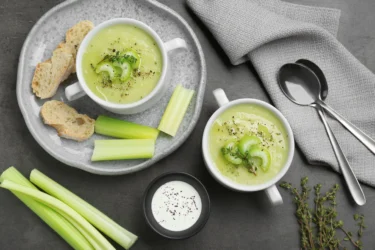
A classic celery soup is a comforting dish that brings out the vegetable’s natural flavours. To prepare, sauté chopped celery, onions, and garlic in butter until they become tender. Add vegetable broth, simmer, and blend until smooth. Season with salt and pepper, and garnish with fresh herbs for a delightful, nutritious soup.

Combine thinly sliced celery with apples, walnuts, and a light vinaigrette for a refreshing salad. The crisp texture and slightly peppery flavour of celery makes it an excellent addition to salads.
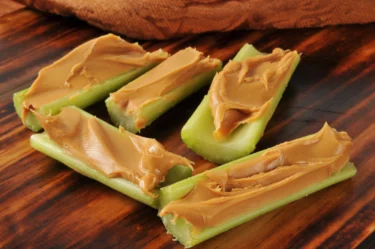
Celery sticks paired with peanut butter can make an ideal snack. The crispness of celery complements the creamy texture of peanut butter, providing a satisfying and protein packed treat.

For a savoury and tangy dip, combine cream cheese, blue cheese, sour cream, and minced celery. This dip is great with fresh celery sticks, making it a perfect appetiser for parties and gatherings.
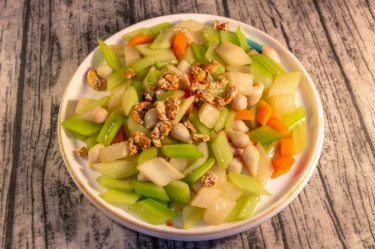
Sautéed celery with garlic and herbs is a delightful side dish that elevates the flavour of this humble vegetable. The gentle sautéing process enhances celery’s natural crunch and imparts it with a subtle garlic and herb-infused aroma. It’s a simple yet flavourful way to enjoy the benefits of celery while adding a delicious touch to your meal.

Incorporate celery into a stir-fry with your choice of protein and other vegetables. The crisp texture of celery adds a satisfying crunch to the dish.
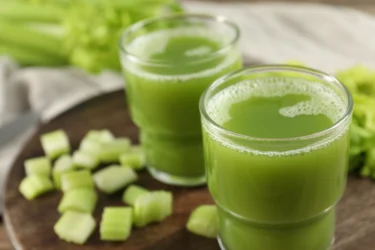
Celery juice, packed with essential nutrients like vitamins A, K, and C, has become a popular health choice. Celery juice may help with digestion and reduce inflammation. However, it’s important to approach these claims with caution, as scientific evidence is still limited. While celery juice can be a refreshing and hydrating addition to your diet, consult with a healthcare professional before relying on it as a cure-all solution2.
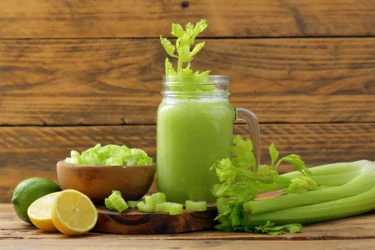
Celery smoothies are a nutritious and refreshing way to incorporate this green vegetable into your diet. These blended concoctions combine celery with ingredients like spinach, apples, and ginger, providing a boost of vitamins, minerals, and antioxidants. Celery smoothies are known for their potential to support digestion, reduce inflammation, aid in weight management and skin health.
These celery recipes highlight the vegetable’s versatility and ability to elevate various dishes. From soups and salads to snacks and smoothies, celery can be a delightful addition to your meals.
While celery is generally a healthy addition to most diets, it is important to note that consuming it in excess may cause digestive discomfort in some individuals. Celery contains mannitol, a type of sugar alcohol, which, in high concentrations, has been linked to digestive issues such as bloating or gas. Research14 suggests that mannitol can be difficult for some people to digest, leading to these unwanted side effects. If you experience discomfort after eating celery, it may be helpful to moderate your intake or consult with a healthcare professional for further guidance.
Dr. Rajeev Singh, BAMS
If you’re considering incorporating more celery into your diet, it’s important to know how to select and store it properly to maximize its nutritional benefits. Keep these tips in mind the next time you’re shopping for or preparing celery, ensuring you make the most of this versatile and healthful vegetable:
One of the best ways to enjoy celery’s dietary benefits is to steam the leafy green for a few minutes to retain its nutrients. This method keeps most of the nutrition locked in, as well as preserves the flavour. You may also eat the leaves since they are high in nutrition (especially calcium and vitamin C) and should be consumed within a couple of days.
Studies8 have shown that some people may have significant allergic reactions when exposed to celery. Some signs include troubled breathing and rashes. I strongly recommend the use and consumption of celery only under the guidance of a medical professional.
Dr. Siddharth Gupta, B.A.M.S M.D (Ayu)
Storing celery properly is essential to maintain its freshness, crispness, and nutritional value. One effective method is to wrap celery in aluminium foil, which helps retain moisture while allowing excess ethylene gas to escape, thereby slowing down spoilage. Alternatively, placing celery in an airtight container can help preserve its hydration and prevent it from absorbing odours from other foods. For optimal storage, keep it in the vegetable crisper drawer of the refrigerator, where the humidity is regulated to suit fresh produce. Another option is to store celery stalks upright in a container filled with water, changing the water every few days to keep the vegetable hydrated and fresh. Following these practices can significantly extend the shelf life and quality of celery.
Studies12 have reported the following side effects of celery:
If you have any adverse reactions to celery, make sure to consult a doctor immediately.
The following are the precautions to be taken before having celery:
However, additional research on celery is needed. Please consult your doctor to avoid any problems.
Celery (Ajmoda) may react with the medications and alter the activity of medicines. However, no such information is available and more research on this topic is required. Please discuss and confirm with a doctor before adding celery to your diet, especially if you are undergoing any treatment.
Celery is widely regarded as one of the best diet vegetables for a health-conscious diet, offering many nutritional health benefits. It is known for its high water content and can be used in many dishes. Celery contains several vitamins, minerals, and antioxidants, and is commonly included in meal plans that emphasise hydration, weight management, and balanced nutrition. Regular inclusion of celery in meals can be a part of maintaining a healthy lifestyle and overall dietary variety.
Also Read: Bottle Gourd (Lauki): Uses, Benefits, Side Effects and More!
Celery is widely recognised for its health benefits, making it a valuable addition to a balanced diet. Its high fibre content and low-calorie nature make it a great addition to a balanced diet. Other benefits of eating celery include promoting hydration, aiding digestion, and providing essential vitamins and minerals.
No, celery and coriander are different plants. Celery is a vegetable with crisp stalks and leaves, while coriander, also known as cilantro, is a herb with fresh leaves and seeds. They have distinct flavours and culinary uses.
No, celery and parsley are not the same; they are two distinct herbs. Celery is a vegetable known for its crunchy stalks and leaves, often used in cooking and as a garnish. Parsley, on the other hand, is a herb with vibrant green leaves, known for its fresh, peppery flavour and is used as a garnish or seasoning in various dishes. While they may look similar, they have different tastes, culinary uses, and botanical classifications.
Yes, celery can be frozen. It’s recommended to blanch it first to retain its freshness. Thawed celery is best used in cooked dishes like soups, stews, and casseroles.
Yes, dogs can eat celery in moderation. It’s a healthy, low-calorie snack for them, but it should be cut into bite-sized pieces to prevent choking, and it’s best served plain without added salt or seasonings. Always consult with a veterinarian before introducing new foods to your dog’s diet.
Yes, celery is a stem vegetable. It is known for its crisp, edible stalks, which are commonly used in various culinary applications.
Yes, rabbits can eat celery in moderation. It’s a low-calorie and hydrating vegetable and can be given as an occasional treat, as excessive consumption may lead to digestive issues. Always introduce new foods slowly and consult a veterinarian to incorporate a well-balanced diet.
Celery typically lasts in the fridge for about 2 to 4 weeks when stored properly. To extend its shelf life, wrap it in aluminium foil or a sealed plastic bag, and keep it in the crisper drawer of the fridge. Trimming the leaves and maintaining humidity can also help keep celery fresh for a longer time.
Cats can eat celery in small quantities, but it’s not a natural part of their diet, and some cats may not show interest to it. If offering celery, ensure it’s cut into small, manageable pieces to prevent choking. Always prioritise a balanced diet for their complete nutrition by consulting with a veterinarian,
Disclaimer: The information provided here is for educational/awareness purposes only and is not intended to be a substitute for medical treatment by a healthcare professional and should not be relied upon to diagnose or treat any medical condition. The reader should consult a registered medical practitioner to determine the appropriateness of the information and before consuming any medication. PharmEasy does not provide any guarantee or warranty (express or implied) regarding the accuracy, adequacy, completeness, legality, reliability or usefulness of the information; and disclaims any liability arising thereof.
Watermelon is well known for its cooling effect, but more than just that, this fruit has other health benefits too. It may help manage diabetes and fight free radicals that can make our body prone to chronic illnesses. It can also lower the risks of developing heart disease, asthma attacks and supports weight loss. This fruit is low on calories, and plenty of vitamin A and C that can keep you healthy.
In this blog, we will discuss about some interesting facts, the nutritional profile and potential health benefits of watermelon. We will also share some simple and tasty recipes of watermelon to help you soak in the benefits of this wonder fruit.
Here are some interesting facts about watermelon that you should know.
Watermelon is a hydrating, micronutrient-rich fruit with a host of vitamins while being low calorie. One cup or about 150 g of watermelon contain just 46 calories, with at least 0.6 g of fibre, along with 11.5 g carbohydrates of which about 9 g are sugars. Although it is not a great source of protein, the benefits of watermelon still contribute to a protein-rich diet with about 1 gram of protein in each 1-cup serving. Vitamin content is where the health benefits of watermelon really shine through, with 5% and 14% of the daily requirement of Vitamin A and C respectively. It also contains 4% each of the recommended Potassium and Magnesium intake1.
Other than being sweet and juicy, watermelon is said to be loaded with several health benefits. Here are some of the potential benefits of consuming this fruit.
This healthy fruit consists of 91% water, which means that it has the capability to meet our body’s hydration needs2. Staying hydrated not just helps with mouth dryness but is also good for our cardiovascular health. Staying hydrated helps keep the body cool during high summers. It helps cleanse the body and also keep skin healthy.
Watermelon is said to have a beneficial effect on blood sugar levels by regulating glucose metabolism and insulin response in the body. This fruit is rich in Citrulline (amino acid) that is converted into arginine (amino acid), which are both found to help protect you from diabetes3.
In case you are wondering how to reduce weight naturally, then don’t miss out on adding this healthy fruit to your weight loss diet. Since this fruit consists of mostly water, it gives you a feeling of fullness and this will curb your appetite from snacking on your favourite food4. Although remember that weight loss requires a combination of a proper fitness routine and a healthy diet. Choosing healthy foods like watermelon can just help in supporting your weight loss efforts.
Lycopene is a substance that is found in watermelon and this gives the fruit its reddish colour. Lycopene is a potent antioxidant that helps fight inflammation in the body. As watermelon is rich in lycopene and citrulline, it can help balance blood cholesterol levels and thereby reduce the risk of developing heart-related diseases5.
The consumption of watermelons increases the levels of arginine, citrulline, and ornithine in your body. these substances are required for the normal functioning of heart and immune systems12.
Dr. Smita Barode, B.A.M.S, M.S.
As mentioned, watermelon is a good source of lycopene which helps fight oxidative stress in the body. It is found to aid in reducing the effects of asthma by regulating airway muscle contraction and mucus secretion. This could mean that consuming watermelon daily can help you fight some of the severe effects of asthma6.
Owing to its healthy nutrient profile, regular consumption of watermelon can help avoid periodontal disease7. This condition affecting the gums and jaw bones, is a common dental problem characterised by tooth loss, infection and is also linked to the risk of heart diseases. The major substances in watermelon that help reduce the adverse effects of periodontal disease include vitamin C and lycopene.
The presence of chronic inflammation in the body is found to cause many serious diseases including heart disease, cancer, and fibromyalgia. Fighting inflammation is important to lower the risk of these conditions, and diet has an important role to play in this. Some studies have found that shifting to an anti-inflammatory diet including daily consumption of watermelon for a long period of time can help lower the levels of inflammation in the body8.
Watermelon can help regulate nerve function. Its high lycopene levels can help in reducing damage to nerve cells and enhance cognitive function9. Moreover, watermelon is rich in potassium and a glass of watermelon juice can help relieve symptoms such as numbness, tingling and muscle cramps caused by low potassium.
Lycopene is found abundantly in watermelon. It has antioxidant and anti-inflammatory potential. Some studies11 indicate it might also be helpful to improve mental processes and thinking.
Dr. Rajeev Singh, BAMS
Heatstroke is a dangerous problem faced by many people in the summer. Sometime this condition may become severe, marked by fever and other symptoms. Watermelon contains electrolytes that can reduce heat stroke risk. Just sip some watermelon juice before going out to keep your body cool and help regulate body temperature.
Regular watermelon consumption can help improve kidney function and enhance flushing of unwanted substances from the body. The main nutrients like potassium in watermelons can help in removing toxins from the body. Citrulline in watermelons is said to have protective effects for the kidney by preventing stone formation and promoting urination (diuresis)10.
Watermelons are rich in carotenoids, which may help avoid degeneration of the eye tissues. While there’s still more research needed to see how lycopene truly supports healthy eyes, for now, it looks promising that watermelon may indeed be good for the eyes.
Watermelon in fruit or juice form has been shown to improve athletic performance and reduce the soreness you feel after working out. It is thought to be related to the amino acid called citrulline. Citrulline may help your body boost nitric oxide production and lead to better blood circulation. Although further research is needed to confirm this health benefit, there’s no harm giving watermelon juice a try for your workout recovery!
Watermelon has both water and fibre, these two nutrients are essential for a healthy digestive system. A diet low in fibre can lead to constipation and other issues. Adding watermelon and other fibre-rich foods to your diet may help ease any indigestion or constipation issues.
Although studies have shown potential health benefits of watermelon, further large-scale clinical trials are needed to confirm these. Yet the rich nutrient profile of watermelon can make it a great addition to your routine diet.
The correct way to choose a ripe watermelon is to look for a pale yellow or cream-coloured spot. This is where the melon rests on the ground and it is light green or white in colour initially. This bald spot changes its colour after ripening of the fruit13.
Dr. Anuja Bodhare, B.A.M.S, M.D (Ayu)
If you do find it tasty to consume watermelon on a daily basis, here are some healthy watermelon recipes that will help you enjoy its benefits in a better way.

Juicy watermelon topped with some coconut yogurt and berries can be a tasty and healthy alternative.
Ingredients:
Well, before preparing this healthy dish, here is what ingredients you will require first.
How To Prepare Vegan Watermelon Pizza
Now that you have all your ingredients ready, here is how you prepare this tasty, juicy and healthy watermelon pizza.
On average, a watermelon has 70% flesh and 30% rind. All parts of watermelon are edible14.
Dr. Ashok Pal, B.A.M.S
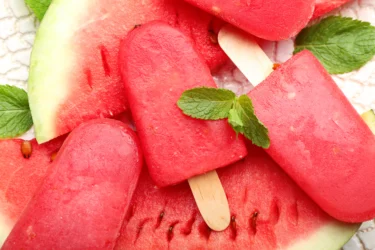
A homemade watermelon popsicle can be a great way to burn the heat this summer.
Ingredients
Here is a list of ingredients that you need to have to get yourself a watermelon popsicle.
How To Prepare Watermelon Popsicle:
Follow the below-listed instructions to get yourself a refreshing and healthy bite of a watermelon popsicle.
Plus, you can easily enjoy a glass of cold watermelon juice anytime or munch some salad out of it. These simple recipes can help you enjoy the taste and soak in the health benefits of this fruit.
Watermelon seeds have amazing health benefits too. These are loaded with nutrients like magnesium, folate, and fatty acids. They are rich in fibres, have low sugar content, and also contain citrulline.
Dr. Siddharth Gupta, B.A.M.S, M.D (Ayu)
Watermelon is a wonder fruit with a host of health benefits ranging from hydration and weight loss support to diabetes, kidney and heart benefits, this fruit can prove to be a great addition to your everyday diet! There are several ways to enjoy this fruit such as consuming its juice or freezing it into popsicles. However like any other food, watermelon too can have side effects if consumed in excess. To be on the safe side, make sure to consult your healthcare provider before incorporating any food item including watermelon to your routine diet , especially if you have any medical condition.
Also Read: 10 Foods To Reduce Body Heat Naturally
If you consume too much watermelon every day, you may end up having too much potassium and lycopene in your body. However, it is advised that you consume no more than 30 milligrams of lycopene every day. In case it exceeds 30 mg, then you may face diarrhoea, indigestion, bloating and nausea. So, all you need to do is to consume just one cup of watermelon every day and this will do you good. For a more personalized advice basis your health conditions, do consult your doctor.
Watermelon may help the liver process ammonia which is a waste that is formed from proteins in the body. Thus, consuming water melon every day may aid in liver health.
There is no direct evidence to suggest that watermelon significantly increases testosterone levels. However, watermelon contains the amino acid citrulline, which may improve blood flow and circulation, potentially supporting overall sexual health. For targeted effects on testosterone, specific lifestyle changes and diet adjustments are more effective.
Watermelon can cause a mild increase in blood sugar levels due to its natural sugar content. However, it has a relatively low glycaemic load, meaning it has a less significant impact on blood sugar compared to other high-sugar foods. People with diabetes or blood sugar concerns should still consume it in moderation and monitor their blood sugar levels.
Watermelon is generally not known to cause acidity and is often considered soothing for the digestive system due to its high-water content and alkaline nature. However, individual reactions can vary, so it’s best to consume it in moderation and observe how your body responds.
When stored properly, a whole watermelon can last in the fridge for about one to two weeks. Once cut, it’s best to consume it within three to four days for optimal freshness. Wrapping the cut side in plastic wrap or storing it in an airtight container can help prolong its shelf life.
Yes, watermelon can be eaten during pregnancy. It’s hydrating and packed with essential vitamins and minerals like vitamins A and C. However, pregnant individuals should ensure that the watermelon is thoroughly washed before consumption to reduce the risk of any foodborne illnesses. As always, it’s essential to consult with a healthcare provider regarding dietary choices during pregnancy.
Watermelon is hydrating and contains vitamins A and C, which can support immune health. While there’s no direct evidence to suggest it treats coughs, its high-water content may soothe a dry throat. However, for persistent coughs, it’s essential to consult a healthcare professional for appropriate treatment.
Disclaimer: The information provided here is for educational/awareness purposes only and is not intended to be a substitute for medical treatment by a healthcare professional and should not be relied upon to diagnose or treat any medical condition. The reader should consult a registered medical practitioner to determine the appropriateness of the information and before consuming any medication. PharmEasy does not provide any guarantee or warranty (express or implied) regarding the accuracy, adequacy, completeness, legality, reliability or usefulness of the information; and disclaims any liability arising thereof.
Coffee is a beverage enjoyed by many. Some people just want their fresh cup of coffee as soon as they get out of bed in the morning. For them, coffee is like the fuel that keeps their body battery charged up.
Black coffee is simply a mixture of boiled water and a tablespoon of coffee without the addition of milk, sugar, or honey. For lactose-intolerant people, black coffee is a boon since there is no milk required to prepare it. Although, black coffee can be healthy for the body if consumed in the right way, its taste may not appeal to many because of the bitterness. Also, it is high in terms of caffeine content and must be consumed wisely to avoid any potentially harmful effects.
In this blog, we will discuss in detail the potential health benefits of black coffee, the possible risks with its regular consumption and how you can safely include it in your routine.
Coffee is naturally rich in vitamin B-2, vitamin B-3, magnesium, potassium, and various phenolic compounds. Also, since it is black and free of milk or sugar, it contains 0% fat and carbohydrates or proteins. A cup of black coffee is also a good source of other micronutrients like manganese, sodium, riboflavin, and niacin. It is high in caffeine, which helps to make you more alert and improves performance. This is arguably the reason most people drink coffee. 100 g of brewed coffee made in tap water contains about 40 mg of caffeine. Lastly, coffee is naturally rich in antioxidants including melanoidins, which help fight inflammation in the body1.
Black coffee is a calorie-free beverage that may help maintain a healthy weight. It is rich in caffeine that may stimulate metabolism and increase your energy level, suppressing hunger.
Black coffee contains chlorogenic acid that helps to slow down the production of glucose. Hence, if you drink black coffee after a meal, it can help to slow down glucose formation. It also contains many antioxidants that can help manage weight2.
But do remember that weight loss requires a combination of regular exercise and healthy diet, and natural remedies like coffee can support these efforts better.
It is well known that caffeine stimulates the nervous system. This stimulation may help increase the adrenalin levels in blood. This hormone is known as ‘fight-or-flight’ hormone, which prepares the body for intense physical activity3.
Many studies4 suggest that drinking black coffee can help you fight diabetes risk effectively. Coffee may help to boost insulin production in the body that may manage blood glucose levels. But do not overdo the consumption of coffee, kindly check with your healthcare practitioner for the correct dosage.
We usually hear that caffeine helps to increase your blood pressure but that is not true. Regular intake of coffee may increase blood pressure but this effect may diminish with time. Studies4 show that regular consumption of coffee may help increase “good” HDL cholesterol, and reduce the risk of cardiovascular disease and stroke.
Did you know that caffeine, the beloved pick-me-up in your favorite drinks, actually has a diuretic effect? It means that it can make you produce more urine and potentially leave you feeling dehydrated. So, while savoring your caffeinated beverages, remember to stay hydrated by quenching your thirst with plenty of water to keep your body in balance and avoid feeling parched.
Dr. Smita Barode, B.A.M.S, M.S.
The liver is a vital organ that works silently to keep our body healthy. Black coffee may help to reduce the level of harmful liver enzymes found in the blood. Some studies concluded that coffee helps reduce the risk of liver cancer, fatty liver disease, hepatitis, and liver cirrhosis5.
Since coffee works as a diuretic (increases urine output), you might need to use the washroom more often than usual. This helps to flush out the toxic material from our body. It helps in keeping your stomach clean and healthy6.
Certain studies7 have shown that coffee may help reduce the risk of getting specific cancers such as liver cancer, colon cancer, and breast cancer. This can be attributed to its antioxidant content, which can help reduce internal inflammation.
Drinking black coffee may combat the normal functions of the brain and keep your brain healthy. It helps keep brain nerves strong and improve your memory8.
Coffee is a magical drink that may help you relax and destress. A cup of black coffee may instantly calm you down and make things better. It may stimulate the nervous system and help to increase neurotransmitters, such as dopamine and serotonin, which can help elevate your mood9.
Alzheimer’s disease affects the older age group, usually 65 years of age and above. Some studies10 have shown that drinking black coffee regularly may have a positive effect on your brain cells and help to reduce the risk of Alzheimer’s disease.
Although studies have shown health beneficial properties of black coffee, further large scale human trials are needed to confirm these.
Here’s an interesting fact: Contrary to popular belief, darker roasts do not have more caffeine than lighter roasts. In fact, lighter roasts tend to contain a slightly higher concentration of caffeine.
Dr. Rajeev Singh, BAMS
Everything beyond a limit can be unhealthy, and so is coffee! Here are some effects of black coffee overdose:
It’s ideal to discuss with your healthcare provider before including black coffee routinely in your diet, especially if you have any medical conditions or undiagnosed symptoms.
Also Read: Natural Home Remedies For Dark Neck
It is recommended that you consume not more than 400mg of caffeine in a day. An ideal amount of coffee would be 1-2 cups in a day. Do not exceed coffee intake for more than 4 cups in a day. To ensure that coffee does not alter or interfere with your sleep, avoid consuming coffee at least 6 hours before your bedtime12.
Be careful with your coffee intake! While low to moderate doses of caffeine (50-300 mg) can offer benefits like increased alertness and energy, higher doses can have detrimental effects on your well-being. These may include feelings of anxiety, restlessness, difficulty sleeping, and a rapid heartbeat. Please be cautious and mindful of your caffeine intake to prevent these negative consequences and prioritize your overall health.
Dr. Siddharth Gupta, B.A.M.S, M.D (Ayu)
In conclusion, black coffee may offer a range of potential health benefits, from helping in weight management and boosting physical performance to potentially reducing the risk of chronic diseases like diabetes and Alzheimer’s. However, moderation is key, as excessive consumption can lead to adverse effects such as anxiety and sleep disturbances. With its rich antioxidant content and minimal calorie load, black coffee can be a valuable addition to a balanced diet, promoting both physical and cognitive well-being when enjoyed responsibly. But like with any other natural remedy, always ensure to consult your doctor before including it regularly in your diet, especially of you have any medical conditions.
Also Read: Everyday Benefits of Jeera Water That You Should Know!
Black coffee’s caffeine content may sometimes lead to loose motions for some individuals due to its stimulant effects on the digestive system. It’s advisable to opt for clear fluids and electrolyte-rich beverages to prevent dehydration and soothe the stomach during episodes of loose motions.
Black coffee may increase acidity for some individuals due to its high acidity levels. However, others may find that its compounds like chlorogenic acid can help regulate acid production. It’s best to monitor individual tolerance and consider factors like caffeine sensitivity and overall diet when managing acidity.
Black coffee’s caffeine content can temporarily elevate blood pressure, but regular consumption doesn’t seem to significantly increase the risk of hypertension in most individuals. However, those with existing high blood pressure should monitor their intake and consider alternatives or decaffeinated options to manage their condition effectively13. Its best to discuss this with your healthcare provider first.
There’s limited direct evidence linking black coffee consumption to acne. However, excessive caffeine intake may disrupt hormonal balance, potentially exacerbating acne for some individuals. Maintaining a balanced diet and hydration level while monitoring caffeine intake can help manage skin health.
Black coffee’s caffeine content can provide temporary relief from headaches by constricting blood vessels and reducing inflammation. However, excessive consumption may lead to caffeine withdrawal headaches, so moderation is key for managing headaches effectively.
Black coffee doesn’t naturally contain sugar, but if sweeteners or syrups are added, it can increase the sugar content. Opting for black coffee without additives ensures a sugar-free beverage.
Black coffee without additives like sugar or cream is generally considered compatible with intermittent fasting, as it contains minimal calories and doesn’t significantly impact insulin levels. However, adding high-calorie ingredients may break the fast by stimulating digestion and insulin response.
Black coffee can temporarily increase body heat due to its caffeine content, which stimulates metabolism and may lead to a slight rise in body temperature. However, any increase in body heat is usually mild and temporary.
Black coffee before a workout can boost performance by increasing alertness and energy levels, thanks to its caffeine content. It may also enhance fat metabolism, potentially improving endurance. However, individual tolerance varies, so moderation is key to avoid negative side effects like jitteriness or stomach discomfort.
Disclaimer: The information provided here is for educational/awareness purposes only and is not intended to be a substitute for medical treatment by a healthcare professional and should not be relied upon to diagnose or treat any medical condition. The reader should consult a registered medical practitioner to determine the appropriateness of the information and before consuming any medication. PharmEasy does not provide any guarantee or warranty (express or implied) regarding the accuracy, adequacy, completeness, legality, reliability or usefulness of the information; and disclaims any liability arising thereof.
Garlic is a spice that is used in the kitchen for centuries. This herb is known to have curative and medicinal properties because of its antibacterial and antiseptic nature. These beneficial properties of garlic are because of a compound, allicin. Garlic is also rich in minerals like phosphorus, zinc, potassium, and magnesium. Vitamin C, vitamin K, folate, niacin and thiamine also are found abundantly in garlic1,2.
Here is the nutritional chart for 100 grams of raw garlic. Note that 1 medium to large garlic clove weighs between 3-8 grams each. The RDI- Percentage of recommended daily intake of garlic is as follows5:
Vitamins
Minerals

Raw garlic has the potential to reduce cough and cold in children and adults3. Research4 suggests that using garlic may help relieve symptoms of congestion in children.

Allicin, a compound found in garlic stops the oxidizing of LDL (bad cholesterol). This reduces cholesterol levels and improves heart health. Regular consumption of garlic reduces the incidence of blood clots and thus helps prevent thromboembolism . Garlic also lowers blood pressure so is good for patients with hypertension1,3,6.

Several studies7 suggest that garlic may be beneficial for brain health because of its antioxidant and anti-inflammatory properties It may be effective in neurodegenerative diseases like Alzheimer’s and dementia6.

Digestive problems improve with the inclusion of raw garlic in the diet. It has shown beneficial effects on the intestines and also reduces inflammation. Eating raw garlic helps to clear out intestinal worms. The advantage of garlic is it promotes the growth of good bacteria and reduces the bad bacteria thus helping in better digestive health6.

Research1 suggests that those who have diabetes may observe their blood sugar levels improve by eating raw garlic, but always consult a doctor to know if this can be beneficial to your case before making changes to your diet.

Garlic may help reduce free radicals and damage to the DNA. The zinc in garlic may promote immunity and the vitamin C may help with infections. Garlic may also be beneficial in eye and ear infections because of their antimicrobial properties1,2.

Garlic helps prevent acne and lightens acne scars. Cold sores, psoriasis, rashes, and blisters may benefit from the application of garlic juice. It may also protect against UV rays and therefore may benefit from ageing8. Garlic may cause skin irritation and chemical burns so use it only under the guidance of a doctor.
Based on my observations, garlic has been potentially used in traditional medicine for ages. It’s pretty fascinating how it can be helpful in different things. For instance, studies2 have shown that garlic may be effective in dealing with warts, denture stomatitis, venous ulcers, and even skin wounds. So, if you’re dealing with any of these issues, using garlic might just do the trick.
Dr. Smita Barode, B.A.M.S, M.S.

Research1 suggests that because of the high amount of antioxidants, garlic may help protect the body against lung, prostate, bladder, stomach, liver and colon cancer. The antibacterial property of garlic helps prevent peptic ulcers as it helps remove the pathogen from the gut2,6.

Garlic reduces the expression of genes responsible for the formation of adipose cells which store fat. It also increases thermogenesis in the body and leads to the burning of more fat and the lowering of LDL (bad cholesterol)2.
Apart from the fact that it is good for weight loss, garlic is highly nutritional. In fact, one clove of raw garlic, which is around 3 grams, contains2,3:

Garlic is considered one of the best ”performance enhancing” substances. In olden times, garlic was used to treat fatigue and improve the work capacity of labourers. Studies on rodents suggest consuming garlic helps in improving exercise performance. People who had heart disease consumed garlic for 6 weeks and this resulted in a 12% reduction in their heart rate and better exercise capacity9.

Fresh garlic juice has the potential to reduce the growth of E. coli bacteria that cause urinary tract infection (UTI). It also helps prevent kidney infections.
Garlic reduces infections on wounds, promotes hair growth, bone health and liver health2. Most of the home remedies are effective only if garlic is consumed raw but should be done only with the supervision of a healthcare provider.

According to studies11 from Japan, raw garlic when aged in a mixture of water and alcohol may have significant effects on exercise endurance. Human studies have also been conducted that have shown that garlic can indeed improve the symptoms of exercise fatigue.

For people who are susceptible to lead poisoning due to occupational hazards, garlic may be the best organic solution. Research suggests that garlic is safer and better at reducing lead poisoning of the blood than d-Penicillamine, which is the common drug used to treat the same10.
Also Read: Natural Blood Thinners: Benefits, Risks, and Precautions

Menopause in older women has often been associated with a lack of the female hormone known as oestrogen due to irregular production of a protein known as a cytokine. Consumption of garlic has been seen to regulate this to some extent and therefore, may be effective in overcoming oestrogen deficiency after menopause1.

Consuming garlic in your regular diet can also help to prevent or reduce the onset of osteoarthritis. Research has shown that garlic contains a compound known as diallyl disulphide which helps to maintain bone density and therefore can potentially delay the onset of bone-related ailments like osteoarthritis.
From what I have seen, garlic oil might possess anti-inflammatory properties. In cases of soreness and inflammation in joints or muscles, applying garlic oil topically may be beneficial2. Rubbing the affected area with garlic oil can potentially help reduce inflammation and provide relief.
Dr. Siddharth Gupta, B.A.M.S, M.D (Ayu)

Garlic is also believed to help reduce the stickiness of the platelets in your blood. These platelets are responsible for the clotting of blood. Consuming a healthy dose of garlic can help reduce the excessive clotting effect of platelets on the blood. Therefore, it may help prevent unnecessary blood clots inside arteries that may reach up to your heart causing a heart attack.
I think that garlic might be good for your arteries and blood pressure. When we eat garlic, the sulphur in it gets converted into a gas called hydrogen sulphide2. This gas may help expand our blood vessels, which makes it easier to control blood pressure. However, it’s always a good idea to talk to your doctor about whether adding more garlic to your diet might be beneficial or not.
Dr. Rajeev Singh, BAMS
When you take cooked garlic by mouth it is usually, safe but can cause side effects such as bad breath, heartburn, gas, and diarrhoea. If you take raw garlic by mouth, the side effects are often worse and may increase the risk of bleeding and cause allergic reactions in some people.
Garlic products like gels and pastes are usually safe. But may cause skin damage that is similar to a burn, especially raw garlic may cause severe skin irritation.
One must avoid having excess amounts of garlic during pregnancy or if breastfeeding. Children can take it in doses of up to 300 mg three times daily for up to 8 weeks and not more than that, people with the bleeding disorders must avoid garlic, if you undergo surgery, do not consume garlic as it may prolong bleeding and interfere with blood pressure. Doctors may advise to stop having garlic two weeks before surgery and garlic may lower blood sugar levels.
Yes, garlic may reduce cholesterol levels, especially LDL (bad) cholesterol, when consumed regularly as part of a balanced diet. Its active compounds may help inhibit cholesterol synthesis in the liver and may improve overall cardiovascular health.
Garlic is generally not recommended for individuals with acidity or acid reflux problems. It can potentially worsen symptoms due to its ability to stimulate gastric acid secretion. People prone to acidity should limit garlic intake and consult a healthcare provider for personalised dietary recommendations.
Garlic has antioxidant and anti-inflammatory properties that may benefit liver health by supporting its detoxification processes. Regular consumption of garlic in moderation as part of a balanced diet can potentially help protect the liver from oxidative stress and inflammation. However, individual responses may vary, and consulting a healthcare provider is advisable for specific liver health concerns.
Yes, consuming excessive amounts of garlic can lead to digestive discomfort, such as upset stomach, bloating, and gas. In some cases, it may also cause heartburn or worsen acid reflux symptoms. Moderation is key to avoiding these issues while still benefiting from garlic’s health-promoting properties.
Garlic may help reduce creatinine levels by supporting kidney function and supporting overall cardiovascular health. Its antioxidant properties can help in reducing oxidative stress in the kidneys. However, specific benefits vary among individuals, and it should not replace medical treatment for kidney conditions.
Garlic is believed to have a positive impact on testosterone levels by enhancing antioxidant status and reducing oxidative stress, which may indirectly support testosterone production. However, more research is needed to establish garlic’s direct influence on testosterone levels in humans.
Garlic has been studied for its potential antibacterial properties, including against H. pylori, the bacteria associated with stomach ulcers. Its active compounds, such as allicin, may inhibit H. pylori growth and contribute to reducing bacterial load in the stomach. However, more research is needed to confirm garlic’s effectiveness as a treatment for H. pylori infection.
There is limited scientific evidence suggesting garlic can directly reduce high prolactin levels. However, its antioxidant properties may support overall hormone balance and contribute to general health benefits, potentially aiding in the regulation of prolactin levels indirectly. Consulting with a healthcare provider for appropriate treatment options is advisable for managing high prolactin levels.
Garlic is not acidic; in fact, it has a slightly alkaline pH. However, it can stimulate gastric acid secretion in some individuals, potentially exacerbating acidity or acid reflux symptoms. Monitoring individual tolerance is recommended when consuming garlic, especially for those prone to digestive issues.
Swallowing garlic may not directly help with acne. However, some people believe that the antibacterial properties of garlic, when ingested or applied topically, can potentially help with acne-causing bacteria. Its anti-inflammatory properties may also contribute to reducing inflammation associated with acne.
Yes, garlic is believed to have thermogenic properties that can increase body heat slightly when consumed in larger quantities. This effect is attributed to its ability to stimulate circulation and metabolism. However, the increase in body heat is typically mild and varies among individuals.
Garlic offers several health benefits. It has antioxidant properties that protect cells from oxidative damage, supports cardiovascular health by improving cholesterol levels and blood pressure, and may have antibacterial and anti-inflammatory effects. Regular consumption of garlic as part of a balanced diet can contribute to overall health and well-being.
Garlic is not recommended for dogs as it can be toxic, especially in large amounts. It contains compounds that can damage red blood cells in dogs, leading to a condition called haemolytic anaemia. It’s safer to avoid feeding garlic to dogs and consult a veterinarian for appropriate dietary choices.
Disclaimer: The information provided here is for educational/awareness purposes only and is not intended to be a substitute for medical treatment by a healthcare professional and should not be relied upon to diagnose or treat any medical condition. The reader should consult a registered medical practitioner to determine the appropriateness of the information and before consuming any medication. PharmEasy does not provide any guarantee or warranty (express or implied) regarding the accuracy, adequacy, completeness, legality, reliability or usefulness of the information; and disclaims any liability arising thereof.
Muskmelon or kharbuja fruit is an incredibly refreshing evening snack for the summer. It has a mild sugary and watery taste that intensifies as the fruit ripens.
Muskmelon is a type of melon belonging to the Cucurbitaceae family. Its scientific name is Cucumis melo var. Cantalupensis. Muskmelon, also referred to as ‘sweet melon,’ got its name from its strong musky smell. It is a yellow-coloured fruit with a pleasant aroma. Muskmelon is said to have originated in the region stretching from India to Africa. It is a summer fruit and is usually available in April to August. In this blog, we’ll explore some of the key health benefits that make muskmelon a fruit worth adding to your seasonal diet1.
Muskmelon is more than just a delicious summer treat, it is packed with essential nutrients that support overall health and well-being. Its rich nutritional profile may make it a powerful addition to your seasonal diet. Here’s a breakdown of the key nutrients found in muskmelon1,2:
Muskmelon is high in water content, which keeps the body hydrated in the hot summer season. It also cools the body and protects it against heat as it consists of a good supply of essential vitamins and minerals2.
Muskmelon can help improve and strengthen the immune system, making it easier for the body to fight diseases. It is rich in vitamin C and vitamin A which helps boost immunity by stimulating the white blood cells in the body. The vitamin A and phytochemicals present in muskmelon may help keep the gut healthy. It is important to note that gut health is directly associated with the immune system3.
Since muskmelon is rich in vitamin A, it is beneficial for eye health. It helps improve eyesight and prevent cataracts. Research4 shows that regular consumption of foods with high vitamin content can reduce the risk of developing cataracts.
I recommend incorporating musk melon into your diet as it has potential anti-ulcer properties. It can help protect the stomach by reducing blood vessel leakage, scavenging free radicals, and strengthening the mucosal barrier. The presence of phytoconstituents like triterpenoids and sterols in musk melon is responsible for these beneficial effects9.
Dr. Rajeev Singh, BAMS
These melons are rich in potassium which helps control blood pressure, thus helps in keeping the heart healthy. They are also rich in a compound called adenosine which is beneficial for the heart as it has blood-thinning properties5.
Muskmelon is high in fibre and water content, which makes it an essential fruit for gut health. The fibre content in muskmelon helps in regulating proper bowel movements with a calming and cooling effect on the stomach1,6.
Muskmelon or shamam fruit is low in fat and calories which makes it beneficial for weight loss. It takes a long time to leave your stomach and enter the digestive tract, thus making you feel full for a longer time7.
Diabetic nephropathy is a dangerous complication of diabetes. In this serious complication, the kidney cells get damaged. A powerful antioxidant in muskmelon called ”oxykine” may help protect these kidney cells in such conditions. Muskmelon extract is also known to have a low glycaemic index (GI) which means that fructose and glucose present in muskmelon are absorbed more slowly in the blood. Thus, this fruit is safe for individuals with diabetes and those who are obese8.
Including melon fruits or its extract in your diet may help protect the liver from drug-induced toxicity. The extract from Cucumis melo (melon) may have a protective effect on the liver. These specific plant compounds in melons can help reduce free radicals, and help in protecting the liver9.
Dr. Siddharth Gupta, B.A.M.S, M.D (Ayu)
Muskmelon is a stress buster fruit that may help relieve stress and keep your mind calm. It contains minerals such as potassium, which is considered a stress-relieving food to help you feel more focused and relaxed1.
Vitamin A present in muskmelon may help stimulate the production of sebum which helps in keeping hair healthy. When you directly apply muskmelon fruit pulp to your scalp it may encourage hair growth, leaving it looking long and lustrous1.
Rich in vitamins, minerals and antioxidants, muskmelon or kharbuja benefits to keep the skin looking healthy and radiant1. It is also rich in collagen (a protein). Collagen helps maintain skin elasticity, keeping tissues firm, soft, and well-hydrated while preventing sagging and dryness.
While the sweet flesh of muskmelon is great for eating, the seeds, pulp, and even the skin can be ground into a paste and used as a natural skin treatment. When applied topically, this paste can help nourish, hydrate, and refresh the skin all over the body.
Over the years, I have observed that muskmelon may be a diuretic. Muskmelon has potential diuretic properties, which means it can help increase urine production and its removal and reduce fluid retention. It can be effective both individually and in combination with other diuretic foods9.
Dr. Smita Barode, B.A.M.S, M.S.
Also Read: Ice Apple: Uses, Benefits, Side Effects and More!
Muskmelon is a naturally hydrating and refreshing fruit that can be a valuable addition to a balanced summer diet. Traditionally enjoyed for its pleasant taste and cooling properties, muskmelon also offers nutritional support with its content of vitamins, minerals, antioxidants, and dietary fibre. While muskmelon is not intended to diagnose, treat, cure, or prevent any disease, its regular consumption as part of a healthy lifestyle may contribute to general well-being during the summer months.
Also Read: 10 Health Benefits and Recipes of Dragon Fruit (Pitaya)
1. Skjonsberg L. June Fruit of the Month: Cantaloupe [Internet]. HealthySD.gov. 2023 [cited 2025 Apr 28]. Available from: https://healthysd.gov/fruit-of-the-month-cantaloupe/
2. Shivapriya Manchali, Murthy C. Muskmelon. Elsevier eBooks [Internet]. 2020 Jan 1 [cited 2025 Apr 28];533–46. Available from: https://www.sciencedirect.com/science/article/abs/pii/B9780128127803000337
3. Din A, Nadeem M, Saeed F, Ahmad MH, Tufail T, Huma, et al. Development and optimization of processing techniques for intermediate moisture muskmelon chunks. Food Science & Nutrition [Internet]. 2019 Aug 30 [cited 2025 Apr 28];7(10):3253–60. Available from: https://pmc.ncbi.nlm.nih.gov/articles/PMC6804771/
4. PHYTOCHEMICAL SCREENING AND IN-VITRO ANTI-CATARACT ACTIVITY ON THE SEED OF CUCUMIS MELO L. ETHANOLIC EXTRACT [Internet]. ResearchGate. 2024 [cited 2025 Apr 28]. Available from: https://www.researchgate.net/publication/374167474_PHYTOCHEMICAL_SCREENING_AND_IN-VITRO_ANTI-CATARACT_ACTIVITY_ON_THE_SEED_OF_CUCUMIS_MELO_L_ETHANOLIC_EXTRACT
5. Manchali S, Chidambara Murthy KN, Vishnuvardana, Patil BS. Nutritional Composition and Health Benefits of Various Botanical Types of Melon (Cucumis melo L.). Plants [Internet]. 2021 Aug 24 [cited 2025 Apr 28];10(9):1755. Available from: https://pmc.ncbi.nlm.nih.gov/articles/PMC8469201/
6. Gao Y, Cai RL, Xie C, Lin YL, Zhang L, Qi Y. Pharmacological basis for the medicinal use of muskmelon base (Pedicellus Melo.) for abdominal distention and constipation. Journal of Ethnopharmacology [Internet]. 2012 Apr 19 [cited 2025 Apr 28];142(1):129–35. Available from: https://www.sciencedirect.com/science/article/abs/pii/S0378874112002528?via%3Dihub
7. K. Gopalasatheeskumar, G. Ariharasivakumar, V.K. Kalaichelvan, T. Sengottuvel, Devan VS, V. Srividhya. Antihyperglycemic and antihyperlipidemic activities of wild musk melon (Cucumis melo var. agrestis) in streptozotocin-nicotinamide induced diabetic rats. Chinese Herbal Medicines [Internet]. 2020 Sep 4 [cited 2025 Apr 28];12(4):399–405. Available from: https://pmc.ncbi.nlm.nih.gov/articles/PMC9476773/
8. Naito Y, Akagiri S, Uchiyama K, Kokura S, Yoshida N, Hasegawa G, et al. Reduction of diabetes-induced renal oxidative stress by a cantaloupe melon extract/gliadin biopolymers, oxykine, in mice. BioFactors [Internet]. 2005 [cited 2025 Apr 28];23(2):85–95. Available from: https://iubmb.onlinelibrary.wiley.com/doi/abs/10.1002/biof.5520230204?sid=nlm%3Apubmed
9. Meghashree N, Satish S. A review on clinical and preclinical pharmacological studies in muskmelon fruit. Int J Pharm Sci Rev Res. 2022 May-Jun;74(2):100-103. doi:10.47583/ijpsrr.2022.v74i02.015. Available from: https://globalresearchonline.net/ijpsrr/v74-2/15.pdf
Disclaimer: The information provided here is for educational/awareness purposes only and is not intended to be a substitute for medical treatment by a healthcare professional and should not be relied upon to diagnose or treat any medical condition. The reader should consult a registered medical practitioner to determine the appropriateness of the information and before consuming any medication. PharmEasy does not provide any guarantee or warranty (express or implied) regarding the accuracy, adequacy, completeness, legality, reliability or usefulness of the information; and disclaims any liability arising thereof.
Next Page »« Previous Page